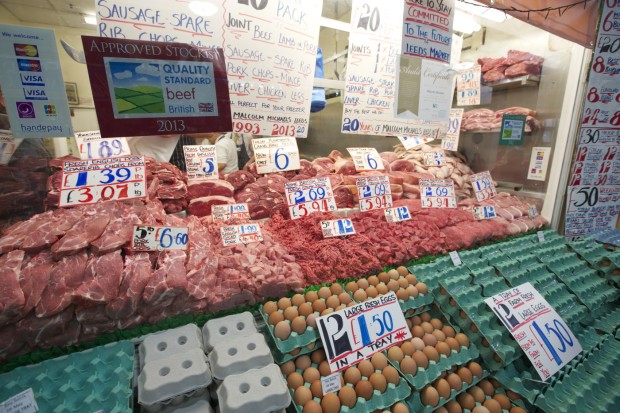You have no items in your cart. Want to get some nice things?
Go shopping
There are two places remaining in Wandsworth’s ever-changing landscape that formed an integral part of my early epicurean lessico famigliare [1]: Hennessy’s butchers and Tooting Market. The rest have fallen away in time, succumbing to the slow but continuous gentrification of the area, and the death of many of its small traders and traditional industries. The sickly-sweet smell of yeast from the Ram Brewery no longer fills the air on certain days of the week – as it did for almost half a millennium – and the sounds of its majestic shire horses fell silent almost a decade ago. The historic site has since been purchased by a Chinese development company, and, like many other places in London, is set to be turned into “an exciting new residential and retail quarter” [2]. Because we need more of those.
My paternal grandparents immigrated to London in the 1950s, arriving in Wandsworth from Malta and the Amalfi Coast. Both had experienced the ravishes of extreme poverty during the War, and came to London in hope of starting a better life. To the neighbours’ dismay, my grandmother kept chickens and rabbits in the garden to help feed her burgeoning family, bringing with her a tradition of cucina povera that her younger brother would later champion all over the world.
Though my early childhood was always filled with exciting tastes and smells, these were all grounded in what Edward Bunyard once referred to as “a temperate enjoyment of the good things in life” [3]. Each meal was a veneration of its season, and each feast echoed the craftsmanship of generations before. I would watch with fascination as my great-aunt Genoeffa prepared graffe, fried doughnut-like Napoletan pastries, or as her youngest sister, Adriana, would make melanzane al cioccolato. It was never easy explaining to school friends just how well aubergines and chocolate go to together.
From these women, I gained a sense of the seasons, and started, as Richard Mabey describes it, “develop[ing] the knack of opportunism, of seizing the moment, the whim, the ingredient in season, the carpe diem of cooking” [4]. There were never shopping lists, we simply bought what looked best. Costs were inherently cut by buying what was in season, and speaking to traders meant that a deal could usually be worked out.
These excursions taught me one of the fundamental principles outlined in Mrs Beeton’s book All About Cooking long before I would ever read it: namely, that:
Good marketing is as important as good cooking, for however efficient and painstaking a cook may be, she can have little success if the ingredients she has to work with are poor.
[5]
Marketing, as my grandmother knew it, was an active verb, an interaction in which she was complicit – not a thing to which a person is unscrupulously subjected. She knew that the cornerstone of a good meal was quality and simplicity.
Writing the introduction to his now (sadly) out-of-print classic, The Epicure’s Companion, food critic and horticultural enthusiast Edward Bunyard wrote: “The most depressing sign of these days is the placid acceptance of the second-rate”. [6] For Bunyard, this was not a question of money or class, but a question of knowledge. According to Bunyard, the middle-class were the worst culprits, “in general fall[ing] between the two stools of snobbery and ignorance”. [7] This notion was backed up by his wife Lorna, who remarked that “to the average middle-class Englishwoman, food is of the nature of sin, and in her system of domestic economy the crime and punishment are swallowed together”. [8]
Sadly, it seems, little has changed in this regard. Walking into Hennessy’s recently to see what was on offer, I listened as a sprightly young mother in front of me asked the butcher for eight pigs’ cheeks. The butcher laughed. Eight. Think about it.
To my grandmother’s generation, such a request would be unimaginable. Not because it is a large quantity of meat – but because those eight cheeks, for them, would be inextricable from the four animals that would have to be slaughtered in order to provide those cheeks. Animals to which many families would have tended over the course of an entire year.
What we do not get a sense of when we buy a packet of bacon from the supermarket is the fact that one of these intelligent, companionable animals can feed a whole family for months, and that the meat from a single animal is of the order of magnitude that a busy butcher might deal with in a week.
While I am glad that “what was in the War impolitely named offal” [9] (and related cuts) seems to have undergone a renaissance under the careful guidance of chefs such as Fergus Henderson at St John, it is a great pity that, for many, this revived interest seems to have less to do with a better understanding of what we eat, and more to do with reaching for an off-the-rail conversation piece for Generation Niche.
We live in a time of food poverty: poverty of resources, poverty of time, and poverty of knowledge. On their own, each is dangerous; coupled with others, they can be deadly. The most pernicious of these types of poverty is almost certainly poverty of knowledge. Poverty of knowledge has led to the emergence of a particular kind of cook, a cook who can produce beautiful food by following very elaborate recipes to a T, but who, unguided, or faced with unanticipated situations, is filled with fear and anxiety.
My grandparents’ generation, and those who came before them, performed acts of alchemy with the little they had. They made simple, robust, nourishing food from the best of the resources available to them. These small, quotidian victories required bravery, ingenuity, and team work. As Bunyard put it, “If we are to escape the deadening influence of machine-made things we must hold on at all costs to our freedom of choice where it still remains to us”. [10] We must hold on to convenience where it is truly convenient, but not where it entraps us. Another way is possible.
[1] Ginzburg, Natalia, Lessico Famigliare, Torino, Einaudi, 1963. Print.
[2] Theramquarter.com,. ‘The Ram Quarter’. N.p., 2015. Web. July 3 2015.
[3] Bunyard, Edward, and Lorna Bunyard. The Epicure’s Companion. London: Dent, 1937. Print, p.vii.
[4] Mabey, Richard. The Full English Cassoulet. London: Chatto & Windus, 2008. Print, p.11.
[5] Beeton, I., Mrs. Beeton’s All About Cookery. London: Ward Lock and Co., 1923. Print, p.59.
[6] Bunyard, Edward, and Lorna Bunyard. The Epicure’s Companion. London: Dent, 1937. Print, pp.vivii,
[7] Ibid., p.viii.
[8] Bunyard, Lorna, and Edward Bunyard. The Epicure’s Companion. London: Dent, 1937, p.15. Print.
[9] Ibid., p.116.
[10] Ibid, pp.lxvii,

About Concepta Cassar
Concepta is a journalist, forager and food writer, with a particular interest in food anthropology, sustainability, and agricultural affairs. Her recipes have been featured in the Guardian, and she writes for a number of organisations, including BuzzFeed, Aftertastes, and the Soil Association. Her other great loves are literature and modern languages. Concepta speaks French and Italian, and has a working knowledge of Spanish and Russian.




